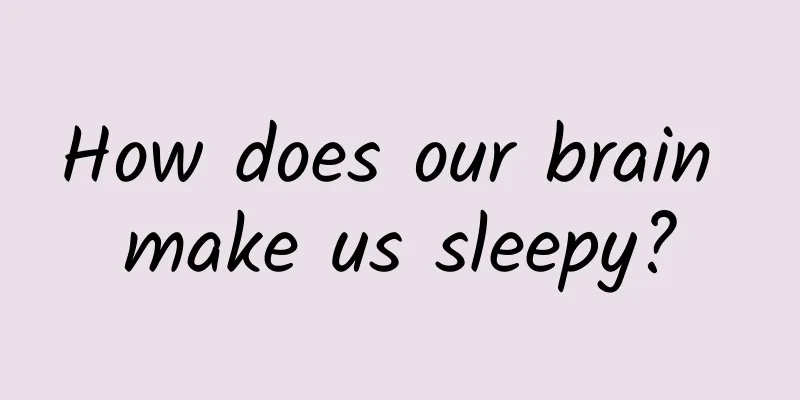How does our brain make us sleepy?

|
Have you ever thought about this question: Why do people feel sleepy? How does our brain make us feel sleepy? Take 3 minutes to briefly understand the two major systems that cause us to feel sleepy. 01 Homeostatic system The function of the homeostasis system is to restore the body to a state of balance and to allow the working system to enter a resting state. The longer you are awake, the lower your body function will be. In order to maintain your body function, the homeostasis system will drive you to rest. Our brain secretes a chemical called adenosine , which is an important substance in the homeostasis system. Adenosine is a substance that can induce sleepiness. The longer we are awake, the more adenosine accumulates in the brain, and the sleepier we feel. Just like when you feel the urge to urinate but ignore it and don't go to the toilet, the urge will become stronger and stronger until you can't hold it anymore and you will choose to go to the toilet. Speaking of adenosine, most people may not know about it, and may not remember it even after seeing it once. It is the substance that makes us sleepy. Don’t worry, after reading the following knowledge point, I believe you will have a deep impression of adenosine. Two knowledge points: The first one Q: Why don’t I feel sleepy after drinking coffee? A: Because caffeine inhibits the accumulation of adenosine, people will become awake as long as they consume foods containing caffeine, such as coffee, tea, Red Bull, etc. The second Q: Why do I feel sleepy after doing physical activity? A: Just the opposite of caffeine, physical activity will promote the accumulation of adenosine, so maintaining moderate exercise during the day will help you sleep. 02 Circadian Rhythm System <br /> The sleep mechanism is not only operated through adenosine and the homeostatic system, but also the circadian rhythm system. It is not accidental that most of us are used to working at sunrise and resting at sunset. Which substance plays an important role in the circadian rhythm system? Melatonin Melatonin is secreted when we are in a dark environment, and when the eyes cannot sense light, a group of cells, essentially the retinal photoreceptor ganglion, receives the signal and sends it to the suprachiasmatic nucleus (SCN). The SCN acts as a timer in the brain, prompting the pineal gland to release melatonin. During the day, the powerful homeostatic pressure that promotes sleep is constantly suppressed by the SCN, so you can overcome sleepiness and accomplish other things. However, as bedtime approaches, the SCN is no longer suppressed, melatonin is released in large quantities, and sleep follows. So, don’t think that it is evolution and genetics that make us hate darkness and pursue light. The reason we work from sunrise to sunset and rest from sunset is that these two systems in our bodies are at work, ensuring that we are awake during the day and sleepy at night. |
<<: Another asteroid hits the Earth. Is humanity ready to face the threat of near-Earth objects?
>>: The discovery of the battery was an accident
Recommend
Known as the "National Seashore Scenic Byway No. 1", what is the origin of this road?
Roads are the main arteries of a city. From the a...
Learn how to operate the entire business from Li Jiaqi
What is your impression of Li Jiaqi? ——The No. 1 ...
Some details and thoughts on “Guess the Picture Song”
Quickdraw’s CNN-RNN model The quickdraw model use...
“Tik Tok Likers” earn over 10,000 yuan a month, is it reliable?
"Making money from those who want to make mo...
The Sea Lion 07 EV is on the market. In addition to demonstrating pricing power again, what else can the e-platform 3.0 Evo bring?
How strong is BYD? It has representative models i...
Is the phone lagging related to the processor or the memory? I finally figured it out today
It is well known that mobile phones will start to...
Which is more secure, Android or iOS? The turning point seems to be approaching...
In fact, objectively speaking, the result of a ga...
How often should you eat hot pot to be healthier? The key is to pay attention to these 5 points!
As the weather gets colder, many people choose to...
AppTalk: How to build an efficient entrepreneurial team and high-quality apps?
Beijing is a city full of entrepreneurial atmosph...
After Walmart fully acquires No.1 Store, can it still expand offline?
Yesterday was the general meeting of all employee...
An inventory of community operation tools!
The author of this article has reviewed and sorte...
To deal with SLE, you must make good use of "strategies" and "military tactics" to attack it, only then can you win
There are thousands of lupus problems. Finding th...
How to push messages to APP (I)
With the development of the Internet and the cont...
Data Methodology | 5 Steps to Analyze Your Own Product Operation Data
Due to the internal development of the company, T...
$1.3 billion deal aborted: iPad's business prospects unclear?
While the iPad unexpectedly sold well in some are...
![[Tools] Recommend 8 promotion and operation tools commonly used by experts, you must know!](/upload/images/67cc3e082b7c5.webp)








